*all opinions expressed are those of those of the original author.
The new Armenian government claims positive developments in the settlement process of the Nagorno-Karabakh dispute, and officials offer smiling faces when meeting with their Azerbaijani counterparts. But the war rhetoric and the settlement principles have not changed so far. In fact, consider the following: the demand by Armenia for the participation of Artsakh Armenians’ representative at the negotiations is not yet a reality; that the cease-fire is regularly broken on the front line; that the arms race is going strong on both sides; that Pashinyan claims that no territory will be ceded to Azerbaijan while his minister of foreign affairs speaks openly of making concessions. How do we interpret these?
This writer suggests analyzing the principles on which the settlement process rest. What legal realities are hidden behind the terminology used? It is submitted that the Armenian side is unclear on its objectives, that the Minsk process failed, and that Armenia should reconsider other remedies and other forums.
The Minsk Group mandate and the Madrid Settlement Principles still constitute the legal and political framework. Here is a bit of background.
The Minsk Group spearheads the Organization for Security and Cooperation in Europe (OSCE) efforts to find a peaceful solution to the Nagorno-Karabakh conflict. It is co-chaired by France, the Russian Federation and the United States.
The mandate states that mediators “will be guided in their activities by the principles and norms of the OSCE, the United Nations Charter, decisions of the OSCE fora, including the decisions by the Council of Ministers on March 24, 1992 and particularly the Budapest Summit Decision, and as applicable resolutions of the United Nations Security Council.”
In 1996, the member states laid out three principles as a legal basis for the peaceful settlement process. The principles were as follows:
1) territorial integrity of Armenia and Azerbaijan; 2) legal status of Nagorno-Karabakh, defined in an agreement based on self-determination, which confers on Nagorno-Karabakh the highest degree of self-rule within Azerbaijan; 3) and guaranteed security for Nagorno-Karabakh and its population, including mutual obligations to ensure the compliance by other parties with the provisions of the settlement.
The Minsk Group “common state deal” proposal of November 1998 included a proposal concerning the Lachin corridor: “The question of the use of the Lachin corridor by Nagorno-Karabakh for unimpeded communication between Nagorno-Karabakh and Armenia is the subject of a separate agreement, if other decisions on a special regime in the Lachin district are not taken proceeding from the agreement between Azerbaijan and Nagorno-Karabakh. The Lachin district must remain a permanently and fully demilitarized zone.”
The Basic Principles for a settlement were introduced by the mediators in Madrid in November 2007. According to them, “they reflect a reasonable compromise based on the Helsinki Final Act principles of Non-Use of Force, Territorial Integrity, and the Equal Rights and Self-Determination of Peoples. The Basic Principles call for inter alia: (1) return of the territories surrounding Nagorno-Karabakh to Azerbaijani control; (2) an interim status for Nagorno-Karabakh providing guarantees for security and self-governance; (3) a corridor linking Armenia to Nagorno-Karabakh; (4) future determination of the final legal status of Nagorno-Karabakh through a legally binding expression of will; (5) the right of all internally displaced persons and refugees to return to their former places of residence; (6) and international security guarantees that would include a peacekeeping operation.
Those principles are supported by all international organizations: United Nations, European Union, and Council of Europe. They have never been denied by neither Armenia nor Azerbaijan.
What does the International Law says about Self-Determination?
Self-determination has been topical since 1945. The struggles for independence were often and still are fueled by ideological or political projects; whether those are the cause or the result of violent and persistent oppressions, most of the time from the majority on the minority. Self-determination is a core political concept in every separatist project. This is the reason why states and international law try to prevent that threat.
The historical background of self-determination is related to the disintegration of empires and formation of nation states at the end of the 19th and early 20thcenturies. President Wilson and his “14 points” declaration in 1918 and the Lenin’s statement on “the socialist revolution and the right of nations to self-determination” converged to create favorable grounds for that process. The world-wide decolonization movement accelerated after 1945. The Charter of United Nations (1945) recognized in its article 1 that the development of friendly relations among nations is “based on respect for the principle of equal rights and self-determination of peoples…” The UN Resolution 1514 (1960) containing the Declaration on the Granting of Independence to Colonial Countries and Peoplesaccords specific rights to indigenous and colonized peoples. The last example occurred on February 25, 2019. The International Court of Justice (ICJ) decided that the process of decolonization of Mauritius was not lawfully completed when that country acceded to independence in 1968, following the separation of the Chagos Archipelago; the United Kingdom is under an obligation to bring to an end its administration and all Member States are under an obligation to co-operate with the United Nations in order to complete the decolonization of Mauritius. The International Covenant on Civil and Political Rights (1966) said in its article 1 that “All peoples have the right of self-determination. By virtue of that right they freely determine their political status and freely pursue their economic, social and cultural development.”
Which ‘Peoples’ Have a Right to Self-Determination?
The notion of people is essential and is still subject to legal controversy because no clear definition has been given to it. State practice rapidly circumscribed it to colonized peoples. The Supreme Court of Canada’s judgement in the case of the Quebec secession stated: “International law grants the right to self-determination to ‘peoples’. Accordingly, access to the right requires the threshold step of characterizing as a people the group seeking self-determination. However, as the right to self-determination has developed by virtue of a combination of international agreements and conventions, coupled with state practice, with little formal elaboration of the definition of ‘peoples’, the result has been that the precise meaning of the term ‘people’ remains somewhat uncertain.”
In 1989, the UNESCO International Meeting of Experts for the Elucidation of the study of the Concepts of Right of peoples, provided a detailed and standard description of a “people:” “a group of individual human beings who enjoy some or all of the following common features: (a) a common historical tradition; (b) a racial or ethnic identity; (c) cultural homogeneity; (d) linguistic unity; (e) religious or ideological affinity; (f) territorial connection; (g) common economic life.” In addition, the UNESCO Experts added that: “The group must be of a certain number which need not be large […] but which must be more than a mere association of individuals within a state”; the group as whole must have the will to be identified as a people or the consciousness of being a people […]”; and “the group must have institutions or other means of expressing its common characteristics and will for identity.”
The Quebec case has somewhat restricted the definition in order to protect the territorial integrity of states: “It is clear that ‘a people’ may include only a portion of the population of an existing state
The protection of territorial integrity of states has been recalled in the UN Resolution 2625 (1970) containing the Declaration on the Principles of International Law concerning Friendly Relations and Co‑operation among States in accordance with the Charter of the United Nations. The Declaration reaffirms the principle of equal rights of peoples and self-determination but meets the expectations of States concerned about it by asserting the principle of territorial integrity to prevent misleading interpretation by secessionist movements or groups. However, it creates a condition on states: they must possess a government representing the whole people belonging to the territory without distinction as to race, creed or color. Otherwise, the default of compliance with the principles of representativeness of “the whole people” (which implicitly induce the majority and minority) belonging to the territory, may, as a last resort, authorize the questioning of the territorial integrity.
It is considered that the theory of “remedial secession,” also referred to as external self-determination principle, is rooted into that Declaration.
Nagorno-Karabakh Scenario Exclusively Based on Self-Determination
Self-determination, therefore, is a process and remedy respecting territorial integrity and its implementation is not possible without the consent of the sovereign state, because it relies upon the democratic and rule of law principles.
Those are the principles currently constituting the framework imposed by the OSCE and enshrined in the Madrid Principles. In other words, Azerbaijan agreed to provide the “highest degree of autonomy” to Karabakh Armenians and a secured and demilitarized physical link to Armenia (Lachin corridor) under the surveillance of a mechanism or a force, still subject to negotiation. Armenia is silent since many years about this reality and one must come to the evidence that if they may still discuss on this matter, it is clear that they have not rejected those principles. One must also bear in mind that the OSCE mandate is clear on the implementation of the four UN Security Council resolutions adopted in 1993, which requested the withdrawal from the occupied districts of Zangelan, Aghdam, Kelbajar and from the city of Goradiz. In sum, Armenia may lose its border with Iran and the security of Nagorno-Karabakh Armenians would depend on a hypothetical security mechanism, the efficiency of which in other disputed contexts proved to be unlikely and not guaranteed.
Is this process also agreed to by the Nagorno-Karabakh Armenians and their elected representatives? If so, when did they agree to such a plan? What gives the right to the Armenian government to state that, following the change of leadership, new conditions, more propitious for a settlement, have been reached? Unable to respond to those questions, one may however observe that Armenia has unclear objectives while Azerbaijan firmly maintains its own. The permanence of the Azerbaijani team of negotiators is not the only difference explaining this matter of fact.
It is important to note that some divergences appeared recently between the statements of Nagorno-Karabakh and those of Armenian government. Moreover, the diplomatic objectives seem at odds too: Armenia negotiates on the basis of the Madrid Principles while the Nagorno-Karabakh leadership and “ambassadors” are lobbying for the political recognition of the NKR independence by third parties. There may be some secret agreement to pursue parallel strategies but in the end, the picture is blurry for foreign observers, including for the mediators. What are the Armenians looking for? Is the objective the independence of Nagorno-Karabakh or is it the self-determination of its Armenian population? What about the security in both scenarios? How can one negotiate with such uncertainties about the final plan? Those questions are all the more relevant that Nagorno-Karabakh Armenians are not participants in the negotiations while they are the ones whose fate and security is primarily at stake.
In addition, while Armenia works exclusively within the political process imposed by the Minsk group, Azerbaijan also has taken a series of legal initiatives to reinforce its firm demand for the implementation of UN Resolutions and the respect of international law for its sovereignty and territory.
Multi-Layered Legal Activism of Azerbaijan
On March 14, 2008, the UN General Assembly adopted a resolution reaffirming the territorial integrity of Azerbaijan, demanding the withdrawal of all Armenian forces. It was adopted 39-7, with 100 abstentions. The introduction and adoption of this bill shows the unequal power dynamic as well as lobbying efforts in international fora.
A letter dated April 10, 2017 from the Permanent Representative of Azerbaijan to the United Nations addressed to the Secretary-General sought a legal opinion on third party obligations with respect to illegal economic and other activities in the occupied territories of Azerbaijan. Based on the International Law Commission articles on state responsibility for international wrongful acts, this document is the basis of further bilateral legal actions against third party countries. For example, France is a target. Departmental prefects (representatives of French Sate in local self-governing bodies) sued in 2018 the mayors of municipalities having adopted and signed friendship agreements with Nagorno-Karabakh municipalities.
We must be mindful of the lawsuits brought by former Azerbaijani inhabitants of Nagorno-Karabakh claiming restitution or compensation for their lost properties. The first case Chiragov and al v. Armenia, (Azerbaijani Kurds from the Lachin district), ended in a condemnation of the Republic of Armenia by the Grand Chamber of the European Court of Human Rights on June 16, 2015. It has been recognized as having effective control over the territory of Nagorno-Karabakh and surrounding territories and condemned to compensate the dispossessed individuals. The Court stopped short of assessing the global political context and self-determination and secession issues inherent to the case.
It is then urgent for the Republic of Armenia and Nagorno-Karabakh leadership to shake out of its torpor and engage in a different political and legal strategy. The Minsk process is a dead-end settlement process if the vital interests of Nagorno-Karabakh Armenians and of Armenia are to be protected. It does not mean that concessions are not necessary but the current settlement principles and implementation steps don’t meet the expectations of Armenian Nation, and primarily those of Nagorno-Karabakh Armenians.
NKR vs. Kosovo
The current official Nagorno-Karabakh line is to lobby for the political recognition of its declaration of independence, taking as model the Kosovo case. It is noteworthy that this option is a failure so far: no state has ever recognized its sovereignty as an independent state under international law, not even Armenia. Therefore, let us look more closely at the International Court of Justice (ICJ) advisory opinion Accordance with International Law of the Unilateral Declaration of Independence in Respect of Kosovo and the stances of Russia, France and the US in this case.
Serbia raised the question at the ICJ. Russia supported the jurisdiction of the court as regards the question, while the Western bloc, namely France, argued against the court jurisdiction to provide an opinion on that subject-matter. The Court recalled that it has repeatedly stated that the fact that a question has political aspects does not suffice to deprive it of its character as a legal question and recognised its jurisdiction. It further reasoned that : “the declaration of independence of Kosovo adopted on 17 February 2008 must be considered within the factual context which led to its adoption” and noted that “the scope of the principle of territorial integrity is confined to the sphere of relations between States” to conclude that “ it was not necessary, in the present case, to resolve the question whether, outside the context of non-self-governing territories and peoples subject to alien subjugation, domination and exploitation, the international law of self-determination confers upon part of the population of an existing State a right to separate from that State, or whether international law provides for a right of ‘remedial secession’ and, if so, in what circumstances.”
Finally one can observe that while the Security Council has condemned the particular declarations of independence, in all of those instances it was making a determination as regards the concrete situation existing at the time that those declarations of independence were made. Hence the opinion considered that general international law contains no applicable prohibition of declarations of independence. Accordingly, it concludes that the declaration of independence of Kosovo did not violate general international law.
It must however be noted that the US and the Special Envoy of the United Nations to Kosovo during the interim administration of the territory did favor the objective of independence. At the time of the ICJ opinion (2010), 55 states had already recognised Kosovo’s independence.
France argued in its amicus brief that it is a matter for each state to determine whether or not it recognizes the existence of Kosovo.
The US argued in its amicus brief that declarations of independence, standing alone, present matters of fact, which are neither authorised nor prohibited by international law and that Kosovo’s declaration of independence was in accordance with Security Council Resolution 1244. They concluded like France that at the point that Kosovo declared independence, however, there was no longer a viable political option or an ongoing future status process.
The Russian Federation argued that the unilateral declaration of independence of Kosovo is not in accordance with Resolution 1244 and not in accordance with international law. They argued that outside the colonial context, international law allows for secession of a part of a State against the latter’s will only as a matter of self-determination of peoples, and only in extreme circumstances, when the people concerned is continuously subjected to most severe forms of oppression that endangers the very existence of the people. The population of Kosovo faced no risk of oppression in 2008.
The Russian Federation’s stance was based on the law, while that of France and the US were political stances.
Considering that none of the three countries that mediate the settlement and negotiation process between Armenia and Azerbaijan have taken a firm position on the independence of Nagorno-Karabakh and instead stick to the Madrid Principles, it may be deduced that the option is not viable at present, although the situation may change.
‘Remedial Secession’ against Referral Secession of Quebec
As it has been demonstrated supra the legal instruments and the state practice recognize the right to external self-determination under extreme conditions. The Supreme Court of Canada said: “international law does not specifically grant component parts of sovereign states the legal right to secede unilaterally from their “parent state” but international law contains neither a right of unilateral secession nor the explicit denial of such a right, although such a denial is, to some extent, implicit in the exceptional circumstances required for secession to be permitted under the right of a people to self-determination (…) and that one of those exceptional circumstances is when the people is oppressed, i.e. victim of attacks on its physical existence or integrity, or of a massive violation of its fundamental rights. The Court made (its or theirs) the conclusions of the Canadian Government amicus brief, which stated that “the Quebec people is not the victim of attacks on its physical existence or integrity, or of a massive violation of its fundamental rights. The Quebec people is manifestly not, in the opinion of the amicus curiae, an oppressed people.”
To sum up, three conditions emerge in the doctrine and in the jurisprudence for authorizing a reconsideration of territorial integrity: (1) Default of compliance with the principles of representativeness of “the whole people“; (2) Gross breaches of fundamental human rights, particularly threats over the physical integrity of the people; (3) No likelihood for a possible peaceful solution within the existing State structure. Secession is therefore envisioned as an ultimate remedy.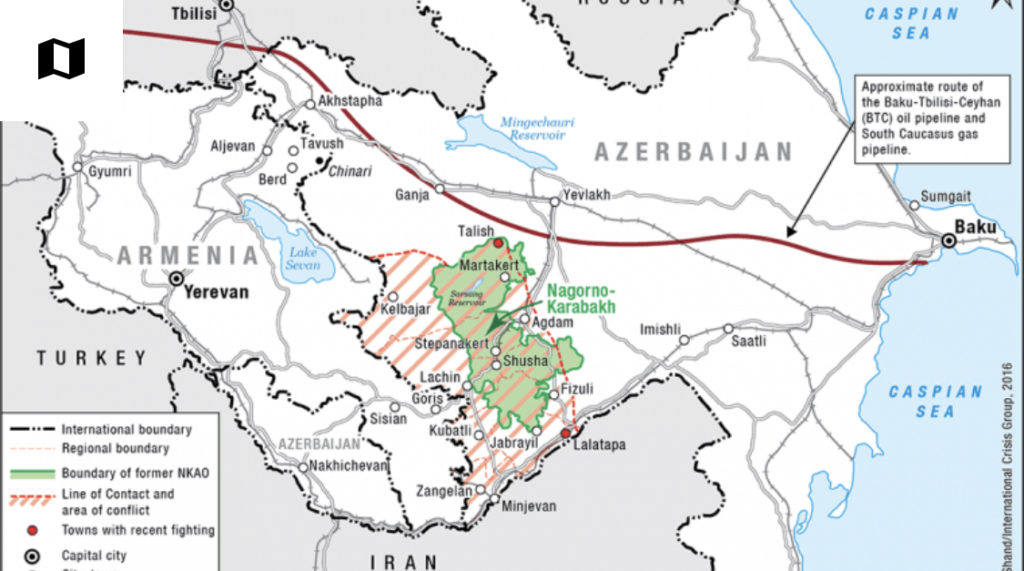
Were Nagorno-Karabakh Armenians in that situation at the time of the secession? Admittedly they were not, are the conditions met today for applying to that remedy?
The first condition is not relevant in the current context. However, the refusal of Azerbaijan to conduct a referendum on self-determination as prescribed by the Soviet Union Constitution and in consideration of the pogroms that took place instead in Sumgait, Kirovabad and Baku in 1988-1990, in response to the peaceful demand of Nagorno-Karabakh Armenians for self-determination, one may consider that the first and second conditions that led to the declaration of independence and further to the de facto secession of the state-territory, were met in 1991. The second condition is even more topical at present. The third condition is reflected in the analysis supra: neither the Nagorno-Karabakh Armenians, nor the Armenian Nation is ready to accept the principle of self-determination as it is foreseen in the law and in the Madrid Principles: the Minsk Process reveals a dead-end after more than 25 years of negotiation.
Legal Grounds for Remedial Secession
The hate speech disseminated by the Azerbaijani Executive and Legislative is a major argument for not trusting any guarantee that Azerbaijani may provide for the security of Nagorno-Karabakh Armenians.
The European Commission against Racism and Intolerance (ECRI) reported (March 2016): “almost all of the 196 hate-speech items dealing with ethnic conflicts were targeted at Armenians. Politicians and civil servants were the main disseminators of hate speech, followed by journalists.” Other sources confirm recurrent hate speech towards Armenians, which is connected to the conflict over Nagorno-Karabakh, the frequent ceasefire violations at the contact line and the resulting deaths and injuries.
The Advisory Committee of the Framework Convention for the Protection of National Minorities for example noted “a persistent public narrative surrounding the conflict over Nagorno-Karabakh identifying invariably Armenia or Armenians as ‘the enemy’ and openly promulgating hate messages”.
This hate speech materialized also in egregious war crimes or barbaric behavior. Witness the “April war” crimes (April 2-6, 2016). In the village of Talish (Nagorno-Karabakh), three elderly members of the Khalapyan family, including 92-year-old Marusya Khalapyan, were brutally killed. Three servicemen, Hrant Gharibyan, Hayk Toroyan and Kyaram Sloyan were beheaded by Azerbaijani military in the vicinity of Talish. Photos of Azerbaijani soldiers posing with the head of Kyaram Sloyan were shared on social networks. Eighteen other servicemen were listed as missing in action. Their bodies later transferred to the Armenian side had signs of torture and mutilation. There is an encouragement to murder Armenians at the highest level of the Azerbaijani state. For an example, Gurgen Margaryan, a lieutenant in the Armenian Armed Forces, was hacked to death in his sleep by Azerbaijani Lieutenant Ramil Safarov in Budapest, Hungary (February 2004). Both men were participating in a NATO-sponsored English-language training course in Hungary within the framework of the “Partnership for Peace” program. Safarov was sentenced to life imprisonment but under questionable circumstances was extradited to Azerbaijan in 2012, where he received a hero’s welcome.
Azerbaijan today is the most active sponsor of denialist groups as regards the Genocide of Armenians committed by the Ottoman Turkish government. Armenians are presented as enemies and murderers (Khojaly). Anzhela Elibegova, the author of a book on Armenophobia writes: “Armenians are the perfect external enemy for Azerbaijani authorities, who use the current situation to aim their propaganda machine in the necessary direction, falsify history and disseminate Armenophobia domestically.”
At last, the threats toward the Armenian nation are quite clearly formulated. Elman Mammadov, an Azerbaijani MP said: “It is not clear why Turkey tolerates Armenian people on its lands. What is the reason Turkey does not require Armenians to free their lands? Turkey should be a state without Armenians […]. If Turkey and Azerbaijan unite, they may wipe Armenia off the map of the world. Armenians should beware of this […].” Hafiz Hajiyev, a leader of the New Musavat Party said: “Our sons will set the nuclear plant in Armenia to explode so that no Armenian is left in that territory.”
The refusal of entry into Azerbaijan of any national of Armenian descent illustrates openly the level of intolerance. By a declaration on 11 January 2019 Russian MFA spokeswoman Maria Zakharova slammed Azerbaijani authorities for discrimination against Russian citizens of Armenian origin in Azerbaijan.
Need for Total Reconsideration
It is submitted that the current official policy of racial discourse by Azerbaijan will lead to the elimination by any means of Armenians from Nagorno-Karabakh, further threatening Armenia. It is no longer possible to implement any internal self-determination or autonomy principle. As a result, the current diplomatic process should recognize that fact and its consequences, namely the compliance with external self-determination conditions.
The right of peoples to freely dispose of themselves, as derived from the UN Charter and from the practice of United Nations. Its corollary, the right to secede, is formally neither authorized nor prohibited (Kosovo, Quebec), it is conditioned (Quebec).
The formation of nation states is not over. Thirty states have been created since 1990 (after the disintegration of the Eastern European Bloc), 60 states in 50 years, and 129 since 1941 (decolonization and remedial secessions). There is no reason why the will of Nagorno-Karabakh Armenians to seek independence, while their existence is constantly threatened, should be ignored.
Without legality, sovereignty is merely a de facto power, the effectiveness of which only depends on the balance of power, and which is therefore only a decoy, especially for weak states.
There must be an end to the current OSCE mandate as it is defined and all the fundamentals of the settlement plan must be reconsidered. The passive attitude of Armenia in the legal field and its exclusive reliance upon the political process create a detrimental legal and political situation to Nagorno-Karabakh Armenians and their self-determination.
[Philippe Raffi Kalfayan is a Lawyer, Lecturer in International Law and a former Secretary General of FIDH (International Federation of Human Rights). He is a regular columnist for the Mirror-Spectator.]


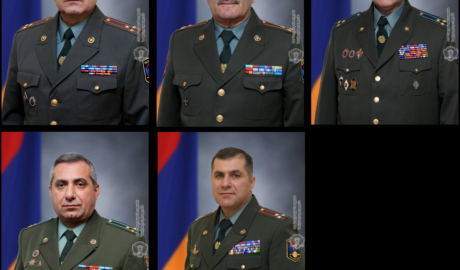


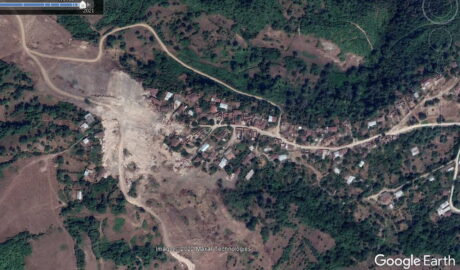
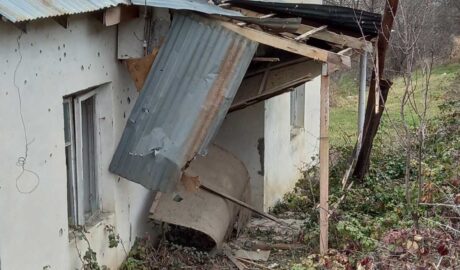
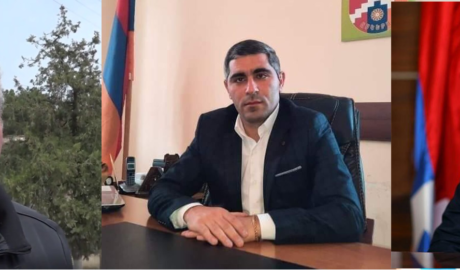
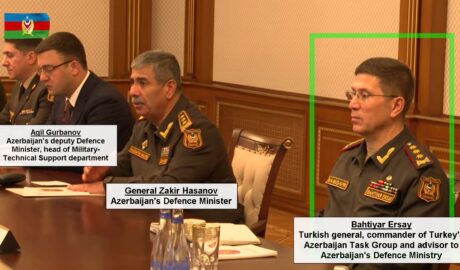
Comments are closed, but trackbacks and pingbacks are open.